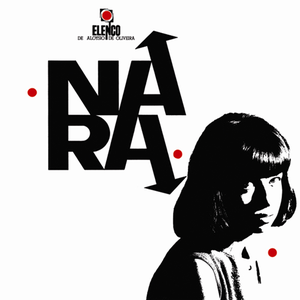When she was twelve, her father gave her a guitar since he was worried about her being shy. Popular musician and composer Patricio Teixeira and classical guitarist Solon Ayala were her teachers. While still a teenager, she met a number of singers and composers who took part of Bossa Nova's musical revolution, in late 50s and early 60s, including Roberto Menescal, Carlos Lyra, Ronaldo Bôscoli, João Gilberto and Antônio Carlos Jobim.
By 1963, after singing as an amateur for a few years, she became a professional and toured with Sergio Mendes. In the mid-1960s, the institution of military dictatorship in Brazil led her to sing increasingly political lyrics. Her show "Opinião" reflected her political beliefs and she had largely switched to political music by this point. In 1964, she even spoke against bossa nova as a movement, calling it "alienating". In 1968, being part of the Tropicália movement, she appeared on the album Tropicália: ou Panis et Circenses, performing "Lindonéia."
She later left Brazil for Paris and in the 1970s abandoned music to focus on her family. She returned to music later and when she discovered, in 1979, that she had an inoperable brain tumor she increased her productivity as much as possible. She died in 1989, leaving a great legacy behind her succesful years of career.
Canção Da Terra
Nara Leão Lyrics
Jump to: Overall Meaning ↴ Line by Line Meaning ↴
Olorum dê
Olorum
I si bê o bá
I si bê o bá
Ave meu pai o teu filho morreu ( bis)
Sem ter um chão para plantar
Sem ter amor para colher
Sem ter voz livre pra cantar
E meu pai morreu ( bis )
Salve meu pai o teu filho nasceu ( bis )
E preciso ter força para amar
Pois o amor é uma luta que se ganha
E preciso ter terra para morar
E o trabalho que é teu ser teu
Só teu de mais ninguém ( bis )
Salve meu pai teu filho cresceu ( bis )
E muito mais é preciso não deixar
Que amanhã por amor possas esquecer
Que quem manda na terra tudo quer
E nem o que e teu bem vai querer dar
Por bem não vai não vai ( bis )
Salve meu pai o teu filho viveu ( bis )
Olorum dê
The lyrics to Nara Leão's song Canção Da Terra are a poignant commentary on the struggles and hardships faced by those who are oppressed and marginalized in society. The repeated refrain of "Olorum dê" serves as a call to a higher power, perhaps invoking a sense of hope and resilience in the face of these difficulties.
The first verse speaks of a father mourning the death of his son, who had no nation to live in, no land to farm, no love to harvest, and no voice to sing freely. This powerful image speaks to the experience of many who are denied the basic necessities of life and the ability to express their own identities.
However, the song also speaks to the importance of resilience and perseverance in the face of these struggles. The second verse calls for the strength to love, despite the difficulties it may entail, and the need for a place to call home and work that is one's own. The repeated refrain of "Salve meu pai" (Hail my father) reinforces the idea of finding strength and hope in a higher power.
Overall, Canção Da Terra is a powerful commentary on the importance of basic human needs and the resilience needed to continue in the face of adversity.
Line by Line Meaning
Olorum dê
Let us call upon Olorum (the supreme god in Yoruba mythology)
Olorum dê
Let us call upon Olorum (the supreme god in Yoruba mythology)
Olorum
We invoke Olorum
I si bê o bá
Whether he wants it or not
I si bê o bá
Whether he wants it or not
Ave meu pai o teu filho morreu ( bis)
Hail my father, your son has died
Sem ter nação para viver
Without a nation to live in
Sem ter um chão para plantar
Without land to plant on
Sem ter amor para colher
Without love to reap
Sem ter voz livre pra cantar
Without a free voice to sing with
E meu pai morreu ( bis )
And my father died
Salve meu pai o teu filho nasceu ( bis )
Hail my father, your son is born
E preciso ter força para amar
It takes strength to love
Pois o amor é uma luta que se ganha
Because love is a fight that we win
E preciso ter terra para morar
And a place to live on
E o trabalho que é teu ser teu
And your work is exclusively yours
Só teu de mais ninguém ( bis )
Yours alone and no one else's
Salve meu pai teu filho cresceu ( bis )
Hail my father, your son has grown up
E muito mais é preciso não deixar
And there's much more to not forget
Que amanhã por amor possas esquecer
That tomorrow you may forget for love
Que quem manda na terra tudo quer
That those who are in charge of the earth want everything
E nem o que e teu bem vai querer dar
And won't even want to give what is rightfully yours
Por bem não vai não vai ( bis )
For good, they won't, they won't
Salve meu pai o teu filho viveu ( bis )
Hail my father, your son has lived
Olorum dê
Let us call upon Olorum (the supreme god in Yoruba mythology)
Contributed by Kayla G. Suggest a correction in the comments below.
